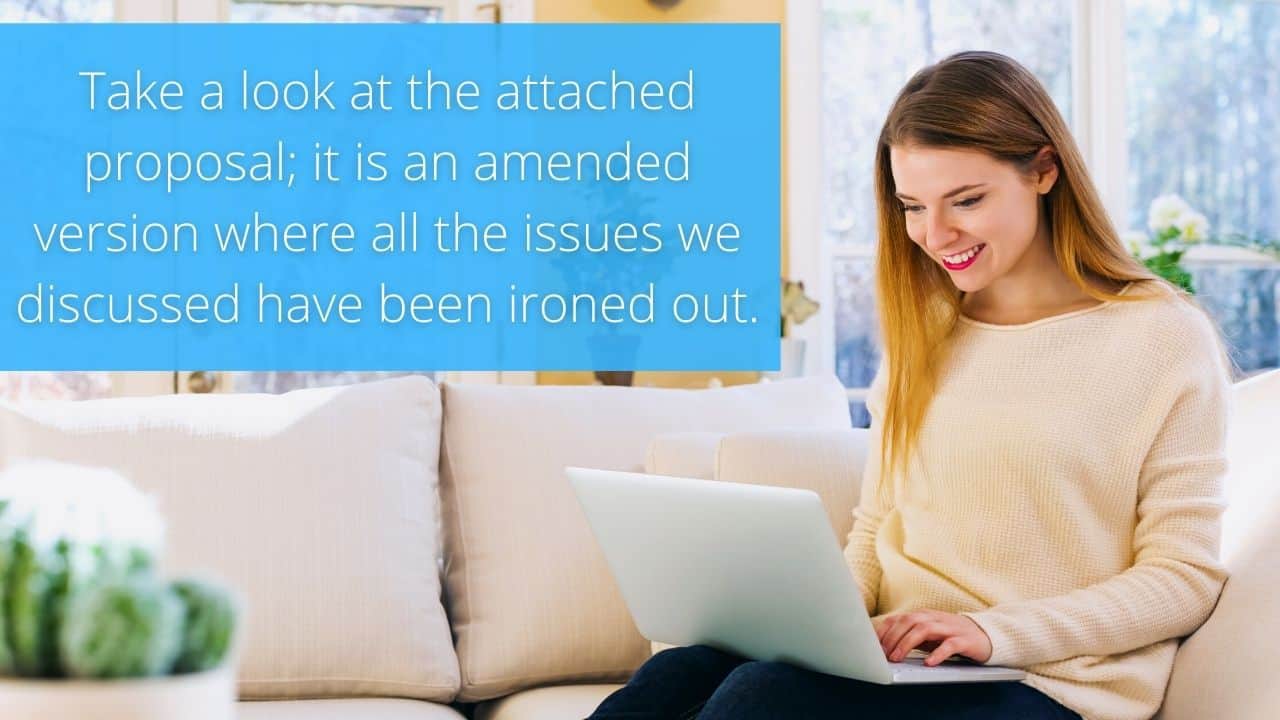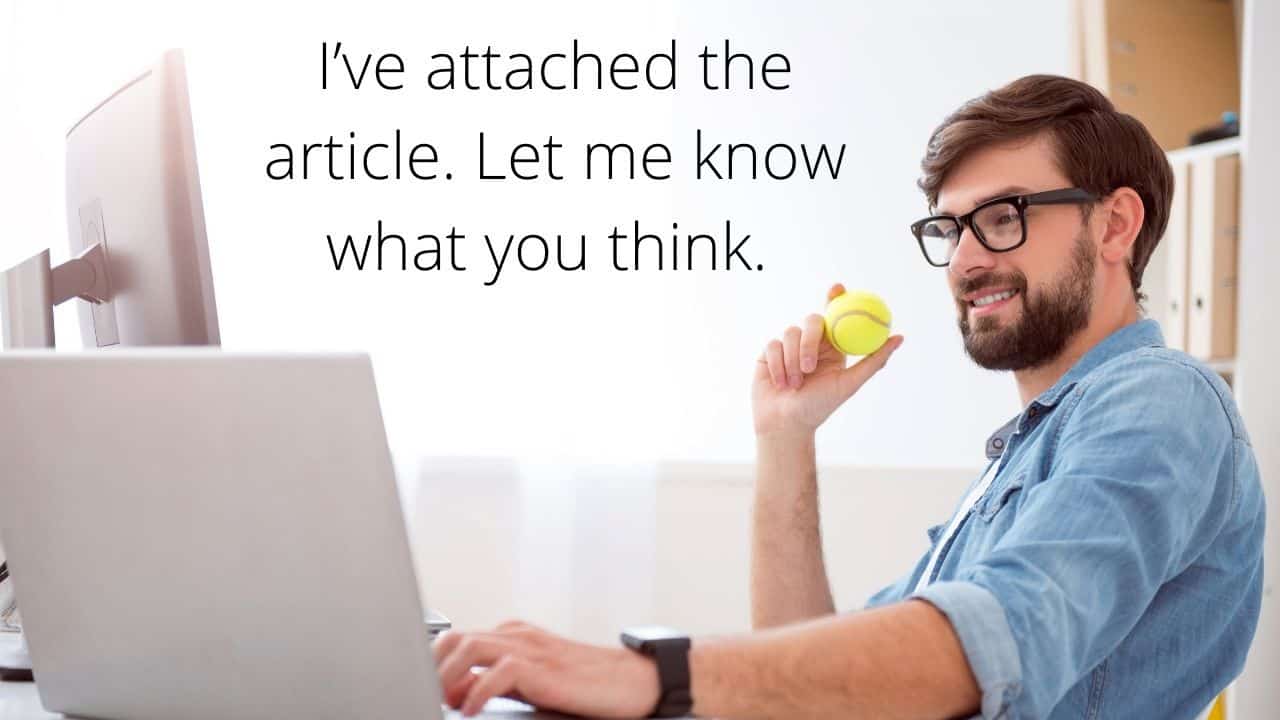Please Find the Attached Document for Your Review
In today'due south ultra-connected globe, i that moves at a break-neck pace, e-mail has become the preferred medium of communication for many professionals.
If you think most it, it kind of makes sense: For one affair, emails don't take up any physical infinite, still, at the same time, you never have to worry about losing a detail e-mail.
Additionally, emails aren't intrusive; they don't interrupt your workflow. And, once you receive an email, you can reply whenever is convenient for yous.
Over and higher up, emails allow you to attach other documents and files to them, making it possible to relay more than simply important information.

9 culling ways to say "please run across attached"
Almost anyone who has worked in a professional person setting has had to send an email with an attachment at i point or another (that'southward if you don't send email attachments every other hour).
Nevertheless, when you do send an email attachment, what do you write in the main trunk of your electronic mail?
Do you say "please see attached"?
Or, do you lot adopt the more formal "kindly find attached"?
Back in the olden days, before we had email and when we had to ship each other physical messages instead, people tended to write "Enclosed please find my (file/ certificate/ take your pick)" anytime they sent a document or other file with their letter of the alphabet.
This might seem stilted to you, simply everybody used the word "enclosed" because this was what they were taught in high school.
Alternatively, almost people today will opt for "please run into attached" or "delight find fastened" given their simplicity and directness.
Yet, both these options can nevertheless come across every bit a chip stuffy and redundant. This is non to mention that, in dissimilar contexts, y'all might want to apply different phrases.
So, let'south take a expect at culling ways of saying "Please see attached."
You tin apply the following phrases when emailing a friend or close colleague; the phrases are informal.
1. Hither is …

When beingness breezy, you don't have to worry about highfalutin language or even using the word please; instead, y'all can be direct and to the point. Using "Here is …" is a perfect case in point.
Even so, this phrase is best used when the master reason yous are sending the e-mail is to ship the attachment. In other words, the entire electronic mail body can be made upwardly of this phrase and only this phrase.
Instance:
Let's say your friend at work asked yous to send them the presentation you were doing tomorrow together. You could attach the presentation to an e-mail, and the email will read as follows:
"Here is the presentation."
It'south that simple.
2. Have a look at the fastened …

Whenever you're out with a friend and y'all want to show them something, practise you tell them "please check this out" or practice you lot but go for the direct "cheque this out"?
Unless you're friends with the well-nigh proper people on the planet (in which case, why?), you lot probably only say "check this out." And, when you do say that, yous are, more often than non, waiting for a response of sorts.
The same thing applies to "have a look at the fastened (file/ certificate/ anything else)." You can use information technology with friends, and it signals that y'all are expecting their feedback in some way.
Interestingly, "accept a look at the attached …" tin can be made more formal if you lot add a please at the beginning, giving you "please have a look at the attached …"
Example:
Let's say that you wanted your colleague's input on your latest draft of a business organization proposal. This is an email yous could ship them.
"Hey,
Yesterday, nosotros went over some of the issues with the business proposal.
Take a wait at the fastened proposal; information technology is an amended version where all the bug we discussed have been ironed out."
3. Don't say anything

At the far end of the informality spectrum, the place where your closest friends live, you can just send a blank electronic mail with the attachment, and they will get it.
You run across, we are all used to receiving important attachments via e-mail, so it never comes as a surprise when we receive a blank email that is cipher more than a conduit for the "enclosed" attachment.
However, if you practise want to write something in your email, y'all even so don't have to betoken out the fact that you've attached a file, especially if the other person is expecting you to send them said file.
Example:
Going to back to the example from above, the one where you were sending your friend the presentation for tomorrow, you could send them the post-obit e-mail:
"Hey,
Get some rest tonight considering we need to exist in tip-top shape tomorrow."
Making it more than formal
As is ordinarily the case in business concern settings, you probably won't exist that familiar with the person you are emailing.
For instance, if you are sending your partner, supplier, or boss an e-mail attachment, y'all won't just transport them a bare email, expecting them to know that the whole purpose of the email is to send an attachment.
So, for those occasions, here are a few phrases you tin can utilize:
four. I've attached …

When you tell someone to "run into the fastened …" or "find the fastened …", at that place is an underlying assumption that they were expecting this zipper at some indicate. For instance, when you are applying for a job, Hr specialists look to observe your resume attached to the email.
So, when you put "please find my resume attached to this email," it comes as a surprise to no one.
Nevertheless, there are other occasions when the recipient of your email isn't expecting an attachment of whatsoever kind.
In these circumstances, seeing an precipitous "please notice attached…" can throw them for a loop.
Instead, should you cull to ship someone an unexpected attachment, just allow them know. Telling them that "I've attached (whatever)" acts equally a signal that prepares them for the coming attachment.
That said, merely because this phrase works when sending a surprise attachment doesn't hateful that you tin can't use information technology when sending an expected attachment; it is perfectly fine to say "As per our chat the other day, I've attached the company's financial statements."
Example:
Let'south say that you wanted to send a helpful article to one of your business partners. Hither's what you lot could say:
"I came across an article in Forbes the other twenty-four hour period, and it reminded me of the conversation y'all and I had at the San Diego conference last calendar month.
I've fastened the commodity. Let me know what you think."
five. I'grand sharing (file/ document/ whatsoever you are actually sharing) with you lot

Like to "I've attached …", this phrase is direct and notifies the recipient of the fact that you've decided to share something with them.
However, it is more formal than "I've attached …", making it more suitable for occasions where you lot want to exude a more professional person aura.
Example:
In the higher up example, the ane where you want to send a helpful commodity to one of your concern partners, here is an alternative version of the same email:
"I came beyond an article in Forbes the other day, and it reminded me of the conversation you and I had at the San Diego conference last month.
So, I'g sharing the article with you lot. Transport me your thoughts."
6. You'll find the (zipper) beneath

Rather than maxim "please find the attachment", you tin can say "you'll find the attachment below." It conveys the aforementioned exact meaning, only it's just a little less stuffy.
Ergo, on the breezy to formal spectrum, this phrase might lean a scrap towards the formal stop, nevertheless it is still fine to be used with friends and acquaintances.
Example:
Let's say that you are applying for a job. So, along with your email, you lot will attach your resume.
Here is what you could say:
"I am very excited about this opportunity, and I hope that we get the chance to work together.
You'll find my resume attached below.
Please do not hesitate to go far touch with me should yous have any more inquiries.
I await forward to your reply."
Bringing out the professional person in you
So far, nosotros've seen how yous can send attachments to your shut acquaintances also as your business partners and colleagues.
But, what near people with whom y'all have no familiarity whatever?
I'm talking about the president of your company, the mayor of your city, or the revenue enhancement agent at the IRS. These are all people you may want to send attachments to, merely you cannot treat them the same way y'all'd treat a partner.
And then, when dealing with them, yous want to go on things i hundred per centum professional.
7. Please exercise not hesitate to contact me should y'all take any inquiries about the zipper

This phrase kills ii birds with i stone: On the one manus, it notifies the recipient that there is an zipper with the email.
On the other mitt, information technology lets the recipient know that you are available for questions should they have any.
Thanks to this one-two punch, this phrase works well with prospective clients likewise as with anyone who might have follow-up questions nearly the attachment you've only sent them.
Example:
Allow's say that your company was applying to take part in a renovation project organized by your metropolis. So, you send an electronic mail to the city mayor containing the following lines:
"Information technology would be an honour for our company to take part in this historic effort.
Please do not hesitate to contact us should you take any inquiries most the enclosed proposal."
8. The requested certificate is attached to this electronic mail

Obviously, this one only works if someone specifically asked you for a detail document; otherwise, you'll just end up puzzling them.
That said, the phrase is concise and to-the-point. What's more, by using the passive voice, information technology comes across every bit more professional; later all, the passive vox conveys objectivity and lack of emotional engagement, two things you desire in a professional person email.
Example:
Let's say that the president of your visitor asked you to send him the proforma budget of your department for next year. Here is an excerpt of the email you could send him:
"The requested documents are attached to this email. Please notify me should you lot have any inquiries."
9. You will find (…) in the fastened document/guide

Similar to a passive argument, this phrase comes across equally professional partially because it removes any active agents, mainly the sender and recipient of the electronic mail.
Instead, the phrase keeps its eyes on the ball and talks nearly the "relevant information" being nowadays within the attachment.
However, this is a tricky phrase to use. For instance, you tin't use it if someone specifically asked for the file you are sending them. In other words, it is best used when the focus of the email is the information itself, not the file.
This will probably make more than sense when you see the below example.
Example:
Let's say that y'all accept been helping a client troubleshoot one of your products. So, this is an excerpt of the email y'all might transport them:
"Cheers for your patience and understanding.
The trouble can exist fixed past tuning the generator. Doing so is a relatively straightforward procedure.
You volition find how yous can tune the generator in the attached guide on maintaining generators. The information you are looking for will be on folio 34.
If yous have any more inquiries or would like further assistance, delight exercise not hesitate to get in touch with us."
As you might have noticed, the purpose of the zipper wasn't to send the entire guide on maintaining generators; rather, the purpose was the specific information on how the client could melody their generator, which was on page 34 of the guide.
Bonus formal alternative expressions to "Delight find attached"
I take attached the requested file below
The message "I have fastened the requested file below" works in a particular context that requires the use of formal language.
Formal language choice is exemplified by the grammatical abyss of the statement also as the avoidance of contractions.
Additionally, this particular message works specifically if the attachment has been indeed requested by the other person.
Also, this prompt must just be used when the attachment is visually located somewhere below the prompt because of the spatial denotation of the adverb "below."
Yous may also either apply appropriate punctuation marks like the colon or period after the terminal word of the message, equally in the example beneath:
Example:
Dear Winston,
Thank you for your reminder.
I take attached the requested file below:
[the file]
Regards,
Valerie
Attached here is the file requested
Another option to utilise is "attached here is the file requested," which also makes utilize of a word with spatial denotation.
The adverb "hither" is always relative to the context of the conversation, specially from the speaker or writer's perspective.
So, when yous see this bulletin in an email, "hither" automatically refers to the virtual infinite where the email belongs.
Yous may also end this prompt with either a period or a colon, but similar in the next example:
Example:
Beloved Jason,
Thank y'all for reminding me well-nigh the product quote, and I repent for the filibuster.
Attached here is the file requested:
[file]
Sincerely,
Patrick
Attached below is the requested file
"Attached below is the requested file" is simply the passive version of "I have attached the requested file below."
Sentence passivization works when the agent is unknown, irrelevant, or already implied in the context of the conversation.
In this prompt, you are doing abroad with the usage of "I" which is already implied and, therefore, irrelevant.
Equally you may effigy, this type of sentence construction is a practical choice especially when your job involves frequent and numerous email exchanges because it shortens your sentences.
Hither's how you might apply "Fastened below is the requested file" in context:
Instance:
Beloved Walter,
I am pleased to approve your asking for an electronic copy of your COE.
Attached beneath is the requested file:
[file]
Sincerely,
Zoey Hernandez
HR Associate

Hey beau Linguaholics! It's me, Marcel. I am the proud owner of linguaholic.com. Languages take always been my passion and I have studied Linguistics, Computational Linguistics and Sinology at the University of Zurich. It is my utmost pleasure to share with all of you guys what I know about languages and linguistics in full general.
Source: https://linguaholic.com/linguablog/please-see-attached/


Belum ada Komentar untuk "Please Find the Attached Document for Your Review"
Posting Komentar